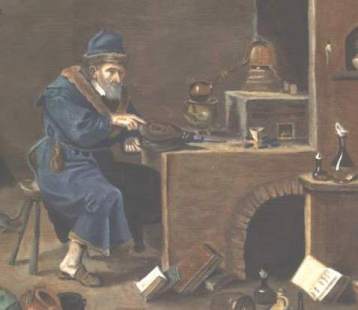|
|
  What exactly is alchemy? What exactly is alchemy?We have all been presented with the rather romanticised view of the venerable old alchemical philosopher huddling over his flasks of bubbling liquid immersed in his quest for the elusive philosophers' stone, a mere grain of which will change a mass of molten lead into the purest form of gold. This image of the alchemist was one which developed relatively early on in the history of alchemy, but it became a very popular view in the 20th century and to most people this is almost all they know about the subject. Another view that developed was that alchemists were mysterious adepts belonging to some secret society and exchanging messages in a coded form. They were even seen as having paranormal powers which enabled them to do all sorts of magical things and live to an extreme old age. Thus alchemists became confused in the popular imagination with the image of the magician. These stereotypical views of alchemy do not really allow us to appreciate the breadth of alchemy and the various ways in which it inspired people over the centuries. This introductory section will, hopefully, let us gain a broader picture of this amazing subject. So how should we view alchemy? Alchemy is a multifaceted subject. It is an early form of chemical technology exploring the nature of substances. It is also a philosophy of the cosmos and of mankind's place in the scheme of things. Alchemy developed an amazing language of emblematic symbolism which it used to explore the world. It had a strong philosophical basis, and many alchemists incorporated religious metaphor and spiritual matters into their alchemical ideas. About four thousand printed books were issued from the 16th through to the late 18th centuries, exploring alchemy from a multiplicity of different perspectives. Many thousands of manuscripts, hand written works, letters, notes and commentaries exist in the libraries of Europe and North America, some beautifully illustrated with coloured images. Alchemy was thus, through the sheer volume of writings, influential throughout the early modern period. Its influence can often be seen in the work of writers, poets, and artists of the time. In the 20th century, interest in alchemy was revived, following its decline and total eclipse in the 19th century. Today alchemy is often used as a catch word for obscure and enigmatic symbolism, or for the idea of spiritual transformation and inner change. How is alchemy approached today? This website tries to reflect these and other views on alchemy. Alchemy is such a multi-faceted subject, that many different perspectives must be taken into account before one can come to any clear understanding of it. You will find many of these different threads explored on the alchemy web site. Different people will find different things when they look at the subject of alchemy. Alchemy cannot be simply explained as one special thing, and given an exact description and definition. Instead it must be looked at from many perspectives and appreciated in the round. |
Introduction Reading list Some quotations Frequently asked questions Common misconceptions Timeline The different ways of looking at alchemy -------
Proto-chemistrySymbolism Psychology allegorical journeys mysticism metaphysical historians of ideas Magnum Opus Books:  The Hermaphrodite Child of the Sun and Moon Three Dreams on the Transmutation of Metals The Pneumo-Cosmic manuscript The Book of Distillation The Speculative Philosophy by Gerhard Dorn The Solidonius Manuscript On the Music of the Spheres by Robert Fludd Bonacina. The Preparation of Potable Gold |